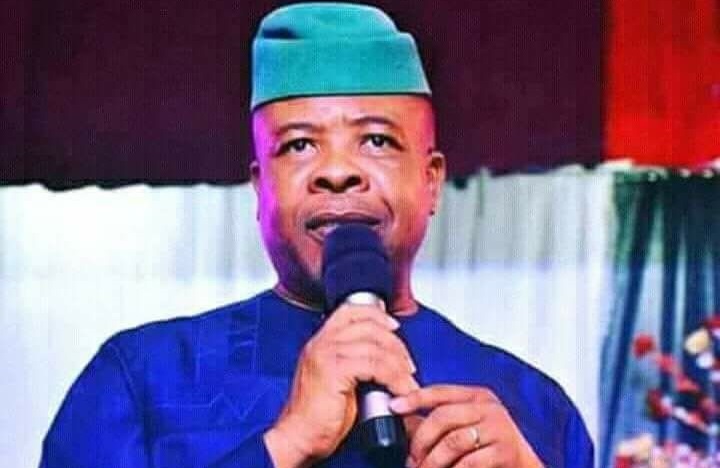BY OKE EPIA
The dusts may have settled. The eastern heartland is no longer the headline news item. At least, as far as gubernatorial litigation is concerned. The mill of governance now grinds. Or so it seems. But the seed of a thousand forests have been sown. And the shoots and boughs spread out beyond the borderlines of Imo. A sunrise moment splurges forth from the sunset of judicial settlement, albeit one of national, nay global steering. But only the discerning can see it. And only those with the innate prescience to scoop victory from the ashes of defeat can appropriate it. That is why the man in the centre of it all deserves his place in history. His moment in the sun cannot be denied him.
When Chukwuemeka Nkem Ihedioha, erstwhile governor of Imo State, set out to challenge the curious January 14, 2020 judgment of the Supreme Court of Nigeria which removed him from office based on the quirky quicksand subterfuge of the incumbent, some questioned his temerity to pursue justice. Among those who did was the lot who believed that justice is inferior to the procedural finality of the apex court of the land. Thus they balked and barked on television and other spaces of public discourse. But the more they did the more the folly of injustice oozed from the miscarried justice they struggled to affirm. Eventually, this minority secured a majority judgment on March 3, 2020 to reaffirm the January 14 heist. But it was a judgment that was hamstrung by a lone voice on the bench. It was no coincidence that the minority judgment of His Lordship, Justice Chima Nweze, was the real story the newspapers feasted on the next day. Again, the winners won to lose while loser lost to win.
“This decision of the Supreme Court will continue to hunt our electoral jurisprudence for a long time to come,” the learned justice said stoically in reference to the flagrant position of his colleagues on the bench. The erudite judge released several sound bites that made mammoth mockery of the majority decision on the matter: “In my intimate reading of the January 14 judgment, the substance of Ihedioha’s matter was lost to time frame. This court once set aside its own earlier judgment and therefore cannot use time frame to extinguish the right of any person. This court has powers to overrule itself and can revisit any decision not in accordance with justice. This court has a duty of redeeming its image. I am of the view that this application should succeed. I hereby make an order setting aside the decision of this court made on January 14 and that the certificate of return issued to the appellant be returned to INEC. I also make an order restoring the respondents as winner of the March 9 governorship election.” Justice Nweze wrote his name in gold and like many have said, history will be kind to him. Ihedioha spoke the minds of millions of Nigerians when he submitted that “even though justice was not served at the end, the well-articulated dissenting judgment delivered by His Lordship, Justice Centus Nweze, has vindicated our stand.”
Advertisement
To put this in proper perspective, Ihedioha’s stand was not for himself alone. His stand was for justice to be served the mass majority of Imo people who voted him as their governor. His stand was for the judiciary of the country, the last hope of the common man, to be rescued from the lurch of infamy it had been thrown into on January 14. His stand was for Nigeria to be redeemed from the cesspool of global revulsion and shame she had sunk into. His stand was for Nigerians of conscience to be saved the unexplainable quagmire of explaining the arithmetical illogic of the winner of a race losing his prize to not the first, second but fourth runner-up, to their children and future generations. His stand was the stand of millions of Nigerians who stood by him during the trying times, calling out injustice and demanding redress. It was therefore ennobling that Ihedioha paid tributes to these millions across the country and different parts of the world in a speech after the legal battle ended. Hear him: “I will forever be in the debt of Nigerians of all walks of life, across ethnic, religious and political divides, senior citizens, journalists, civil societies, ordinary men and women of good conscience, who added their voice to condemn the injustice done in our case. These are people unknown to me personally but who could not bear the illogic of turning number four to number one on the basis of a fraudulently procured result, and appealed to the Supreme Court to save itself and our judiciary.” He continued: “Whatever may be the personal injury I suffer as a result of the miscarriage of justice, my main concern in this whole tragic episode is not about me. It has always been about the implications this judgment could have for the future of our democracy and the right of the electorate to have their votes count.”
This is the stuff real leaders are made of. And for those who know Ihedioha closely or have followed his over two two-decade long political trajectory, this should not come as a surprise. For the period he has straddled the political terrain, the former governor has been through thick and thin. He fought alongside allies and activists in the Peoples Democratic Movement (PDM) to give the military a chase away from power. By serving in various capacities in the presidency and national assembly in the early years of the fourth republic, he bolstered the resource of the Peoples Democratic Party (PDP) to help steer Nigeria away from the ruins of military rule into a burgeoning democracy battling diverse development challenges. These experiences prepared him lavishly to serve the people of Aboh Mbaise/Ngor Okpala federal constituency in the House of Representatives by the time he got elected to represent them in 2003. Being a notable mobilizer, deft politician and team player, Ihedioha stepped up his hold on the politics of Nigeria when he emerged Chief Whip of the House of Representatives in 6th assembly. By the succeeding 7th House, he had networked so adroitly and was voted unanimously as the deputy Speaker in a move that stunned bookmakers. His milestones in the legislature are legion both in terms of lawmaking and representation. The records are undisputable and undisputed. Riding on the springboard of that high office, he contested for the governorship of Imo in 2015 and lost. But he did not give up, and by the 2019 general elections, gave it a shot again. He won this time. And in the seven months that he called the shots at the government house, the fortunes of Imo State had been reversed from marked misgovernance and leadership decay into a setting of rule of law, due process, respect for and strengthening of bureaucratic and administrative structures of service delivery. With several accolades, including being the least corrupt state in the country, to boot, Imo had become a darling attraction to development partners and a destination for local and global investors. The people of the state had at last found a governor in the mold of late Sam Mbakwe, the reference standpoint for good governance in the history of the eastern heartland. The records are available and this space is not enough to chronicle all the achievements of the Ihedioha administration in Imo. No doubt, posterity will be kind to him. His removal from office by the Supreme Court did cut short a vision; and an already delivering mission to make Imo great. But like he said in his thank you speech after the judgment, “I am firmly resolved never to give up on the struggle for a better Imo State. And for a better governed Nigeria.” Truth is Ihedioha already towers above the governorship. His best days are yet ahead. Please join me in dispatching 55 happy cheers to mark his birthday anniversary on March 24.
Epia writes from Abuja
Advertisement
Views expressed by contributors are strictly personal and not of TheCable.
Add a comment






